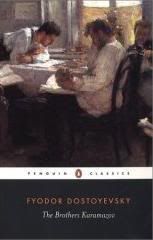Believing From Within
| Fyodor Dostoyevsky wrote about a character called Alyosha in The Brothers Karamazov. Doystoyevski portrays this character as someone who is not an intellectual heavyweight but is still able to find great meaning in life. A common problem for writers seeking to portray inwardly significant characters is that inward greatness is hard to appreciate in our world (and maybe impossible to recognize in another person). Most people, such as the Apostle Thomas, seem to live their lives on the basis of what can be verified by evidence. But Alyosha is different. |  |
Without further ado here is the passage:
... It seems to me that Alyosha was even more of a realist than anyone. Oh, it cannot be denied that in the monastery he believed completely in miracles, but in my experience miracles never bother a realist. It is not miracles that incline a realist towards faith.To put the believing in terms of the inside versus the outside: the problem is not that people have a hard time accepting truth in the external world. On the contrary, people have a hard time accepting the truth they keep deep, down in the basement of their hearts.
The true realist, if he is not a believer, will invariably find within himself the strength and the ability not to believe in miracles either, and if a miracle stands before him as an incontrovertible fact, he will sooner disbelieve his senses than admit that fact. And even if he does admit it, it will be as a fact of nature, but one that until now has been obscure to him. In the realist it is not faith that is born of miracles, but miracles of faith. Once the realist believes, his realism inexorably comples him to admit miracles too.
The Apostle Thomas declared that he would not believe until he saw, and when he saw, said: 'My Lord and my God.' Was it the miracle that had made him believe? The likeliest explanation is that it was not, and that he came to believe for the sole reason that he wanted to believe and, perhaps, in the inmost corners of his being already fully believed, even when he said: 'Except I shall see ... I will not believe.'
For Dostoyevsky the reason to accept or deny a view is simply whether or not one wants to accept or deny the view. The evidence often turns out to be merely a diversion to overlook ones wishes in hope of finding acceptance in the eyes of others.
But the life of devotion is personally conscious of what it longs to believe. As the writer of Hebrews said of faith, "It is certain of what is unseen. This is what the ancients were commended for."
Labels: Dostoyevsky


2 Comments:
Haha! I remember that part. Still making my way through. I'm getting bogged with other things... I started the book a year ago, and so far I'm just past Dmitry's interrogation. Gotta finish up... I've got Crime and Punishment, and the Adolescent waiting...
I forgot to mention that "Works of Love," from what I've read so far, it great. "Provocations" is pretty much a must-have... it's a collection of short excerpts from all sorts of his writings... great for quickly dipping into Kierk here and there. Practice is good... I learned some important stuff from it. In a way, it is an answer to Sickness... offering the "cure," though he is not philosophically rigorous in this one. I also read some Either/Or, the second part, and that was interesting. Also, I've got repetition bound with fear and trembling... at some point I'll have to buckle down and read those.
Yeah... Barth hismelf is a fascinating fellow. You might be interested in reading his "Epistle to the Romans," which is a commentary. I've definitely found it insightful.
Anyways, I like this passage from Brothers... there's so much... I've forgotten these little morsels.
peace,
Jathan
Pretty! This has been a really wonderful post.
Thanks for providing this info.
Also visit my homepage - nikon digital camera
Post a Comment
<< Home